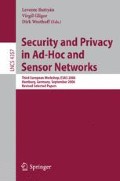Abstract
Confidential communications require entities to mutually authenticate and establish secure communication channels, where the latter requires secret keys to be established between entities. Both —mutual authentication and secure communication— can be achieved by non–revoked public key certificates. However, in infrastructureless networks —such as ad hoc networks—, online trusted third parties (TTP) may not be present that can distribute the required information to verify the revocation status of a certificate. This can prevent confidentiality from being provided. In this paper we define a protocol which permits nodes in an ad hoc network without a shared secret key and without guaranteed access to a TTP, firstly, to mutually authenticate and, secondly, to verify the revocation status of a certificate.
Access this chapter
Tax calculation will be finalised at checkout
Purchases are for personal use only
Preview
Unable to display preview. Download preview PDF.
References
Housley, R., Polk, W., Ford, W., Solo, D.: Internet X.509 Public Key Infrastructure Certificate and Certificate Revocation List (CRL) Profile. RFC 3280 (Proposed Standard), Updated by RFC 4325 (2002)
Myers, M., Ankney, R., Malpani, A., Galperin, S., Adams, C.: RFC 2560: X.509 Internet Public Key Infrastructure Online Certificate Status Protocol – OCSP (1999)
Zhou, L., Haas, Z.J.: Securing Ad Hoc Networks. IEEE Network 13(6), 24–30 (1999)
Luo, H., Zefros, P., Kong, J., Lu, S., Zhang, L.: Self–securing Ad Hoc Wireless Networks. In: Seventh IEEE Symposium on Computers and Communications (ISCC 2002) (2002)
Capkun, S., Buttyán, L., Hubaux, J.P.: Self–Organized Public–Key Management for Mobile Ad Hoc Networks. In: Proceedings of the ACM International Workshop on Wireless Security (WiSe) (2002)
Dodis, Y., Reyzin, L., Smith, A.: Fuzzy extractors: How to generate strong keys from biometrics and other noisy data. In: Cachin, C., Camenisch, J.L. (eds.) EUROCRYPT 2004. LNCS, vol. 3027, pp. 523–540. Springer, Heidelberg (2004)
Prabhakar, S., Pankanti, S., Jain, A.: Biometric recognition: security and privacy concerns. IEEE Security and Privacy Magazine 1, 33–42 (2003)
Newton, E.M., Woodward, J.D.: Biometrics: A technical primer. The RAND organization (2001)
Burr, W.E., Dodson, D.F., Timothy Polk, W.: Electronic authentication guideline. NIST Special Publication 800–63 Version 1.0.1 (2004)
Menezes, A.J., van Oorschot, P.C., Vanstone, S.A.: Handbook of applied cryptography. CRC Press, Boca Raton, Florida (1996)
Papadimitratos, P., Haas, Z.J.: Secure routing for mobile ad hoc networks. In: Proceedings of the SCS Communication Networks and Distributed Systems Modeling and Simulation Conference (CNDS 2002), San Antonio, TX, USA (2002)
Chaum, D., van Antwerpen, H.: Undeniable signatures. In: Brassard, G. (ed.) CRYPTO 1989. LNCS, vol. 435, pp. 212–216. Springer, Heidelberg (1990)
Chaum, D.: Zero–knowledge undeniable signatures (extended abstract). In: Damgård, I.B. (ed.) EUROCRYPT 1990. LNCS, vol. 473, pp. 458–464. Springer, Heidelberg (1991)
Barker, E., Barker, W., Burr, W., Polk, W., Smid, M.: Recommendation for Key Management – Part 1: General(Revised). NIST Special Publication 800–57 Version 1.0.1 (2006)
Ellison, C., Schneier, B.: Ten Risks of PKI: What You’re Not Being Told About Public–Key Infrastructure. Computer Security Journal 16(1), 1–7 (2000)
Diffie, W., Hellman, M.E.: New Directions in Cryptography. IEEE Transactions on Information Theory IT–22(6), 644–654 (1976)
Author information
Authors and Affiliations
Editor information
Editors and Affiliations
Rights and permissions
Copyright information
© 2006 Springer-Verlag Berlin Heidelberg
About this paper
Cite this paper
Kounga, G., Walter, T. (2006). Identification in Infrastructureless Networks. In: Buttyán, L., Gligor, V.D., Westhoff, D. (eds) Security and Privacy in Ad-Hoc and Sensor Networks. ESAS 2006. Lecture Notes in Computer Science, vol 4357. Springer, Berlin, Heidelberg. https://doi.org/10.1007/11964254_7
Download citation
DOI: https://doi.org/10.1007/11964254_7
Publisher Name: Springer, Berlin, Heidelberg
Print ISBN: 978-3-540-69172-3
Online ISBN: 978-3-540-69173-0
eBook Packages: Computer ScienceComputer Science (R0)

